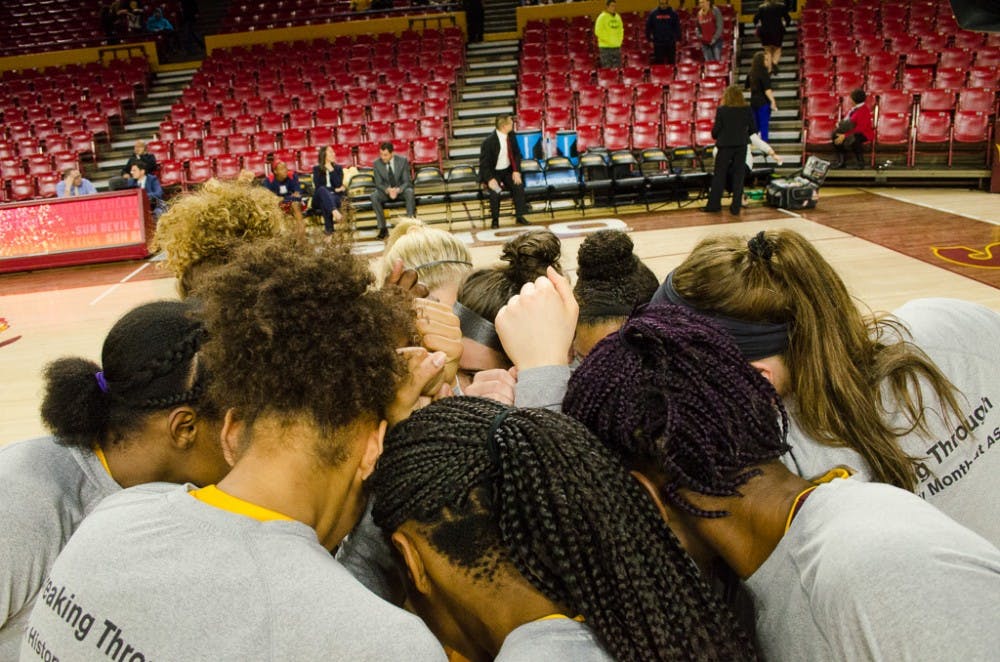It has been 46 years since the passing of Title IX — so why are women's sports still being overlooked?
A common generalization is that women's sports aren't as entertaining to watch as their male counterparts. Here at ASU, statistics show that fans are buying into this.
Over the course of the 2017-18 season, the average attendance for ASU men's basketball home games has been 10,603. Meanwhile, the average attendance for the women's home games has been a humble 2,863.
The same can be said for baseball and softball, where the boys typically get over a thousand more attendees at their games.
One may argue that the women's basketball team simply wasn't as impressive as the men's this year, judging by the increased attention resulting from the men's team's atomic early success this season. However, the women's team held its own during conference play, which is something that the men struggled with.
The women earned a No. 7 seed in their fifth consecutive trip to NCAA Women's Division I Basketball Tournament, tying the Sun Devil record for tournament berths. Yet, the men are seeded at No. 11 and on their way to the NCAA Men's Division I Basketball Tournament for the first time since 2014.
Despite reaching No. 3 in the AP rankings earlier this season, the men's team was among the last selected to make the tournament after disappointing conference play.
Some coaches' salaries show a disparity in value as well.
Men's basketball head coach Bobby Hurley's current contract is $1.4 million, while women's head coach Charlie Turner Thorne's is almost $1 million less.
The same can be said for baseball and softball. While baseball coach Tracy Smith's salary is currently $405,000, softball coach Trisha Ford makes $156,000.
Even those whose profession is to watch and appreciate sports have voiced negative opinions towards women's sports. In 2015, Sports Illustrated writer Andy Benoit tweeted that not only does he dislike women's soccer, but that "women's sports in general are not worth watching."
Benoit later deleted the tweet after facing backlash. Yet, while Benoit was condemned for his misogyny, many people in the world still agree with him.
The argument that women's sports are just not as fun to watch is inaccurate.
Today, we have more strong, impressive female athletes being recognized. The 2018 Winter Olympics showcased real life superheroes like Chloe Kim, Lindsey Vonn and Mikaela Shiffrin. Former NBA player Kobe Bryant himself has praised Phoenix Mercury guard Diana Taurasi as being "The White Mamba" upon breaking the all-time WNBA scoring record.
It is still not enough.
We need to recall more female athletes' names than Venus and Serena Williams. We need to recognize the Katie Ledeckys of the world more often than just every four years.
The problem is not that these athletes aren't worth watching. The problem is that not enough people are excited to watch them. Changing this can only begin with proper marketing.
Paesley Benaza, a Ph.D student at the Walter Cronkite School of Journalism and Mass Communication who focuses on the inclusion in the business of media and sports, said investing in sufficient marketing and branding is critical to heightening interest level to create more revenue.
"Marketing plays a huge level on both men's and women's sports, but because the lack of revenue on the business side of women's sports, you have to be an investor if you want it to succeed," Benaza said.
After working with both NBA and WNBA players, Benaza said the one glaring difference between the two was the amount of fans.
"You can't tell me the WNBA game isn't as exciting as the NBA — it's just not as crowded," she said.
There are some big-name companies that are now aligning themselves with female sport organizations and teams to get more of that word out. The WNBA 2018 Draft is being held at Nike Headquarters in New York City. If an international marketing giant like Nike leads the way, more will follow suit.
"I think that marketing companies now have a responsibility to women," Benaza said. "They recognize women are major consumers. I think they are changing, and they want to hit that target market. They have to figure out a way to get to the point of our lifestyle. We can like sports and wear make-up at the same time. It's not either/or."
The media has to play its part, as well. There is an extreme lack of coverage on women's sports in the mainstream media.
"As a journalist, we all want our stories to be read. It has to have an audience," Benaza said. "I get why things are the way they are, but if we do care about equality and gender parities, you have to stand up for that coverage because it's the right thing to do."
From the #MeToo movement, Black Lives Matter movement, and now the March For Our Lives, change is happening. Change within the sporting world to be more inclusive of women is possible.
We can make change on the University level as well. It's up to students and fans to root for all of ASU's teams, regardless of gender. Coming out to games would be a great start.
Although we've made strides in recent years, much more is needed. It is imperative that we keep supporting our female athletes and showing up for them like they do for fans on game days.
"It's up to the next generation to keep moving it forward," said Benaza.
Reach the columnist at kcdoyle2@asu.edu or follow @kellydoyle06 on Twitter.
Editor’s note: The opinions presented in this column are the author’s and do not imply any endorsement from The State Press or its editors.
Want to join the conversation? Send an email to opiniondesk.statepress@gmail.com. Keep letters under 500 words and be sure to include your university affiliation. Anonymity will not be granted.
Like The State Press on Facebook and follow @statepress on Twitter.




